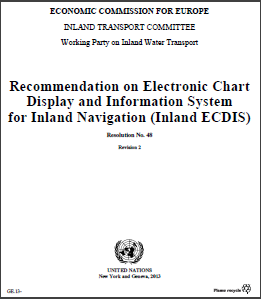 Harmonized requirements to the construction of inland navigation vessels not only ensure the safety of navigation but also facilitate the recognition of ship's certificates, thus eliminating the need for more than one inspection of vessels engaged in international transport by inland waterways. Since 1975, UNECE Recommendations on Technical Requirements for Inland Navigation Vessels (Resolution No.61) offer pan-Europeans standards on inland vessels and crew, based on the existing legislation in the EU and non-EU member States. Resolution No.61 also harmonises the minimum manning requirements and the working and rest hours of crews. In addition, the basis for the recognition of boatmasters for both commercial and recreational vessels across the river basins in Europe is established by the UNECE Resolutions Nos. 31 and 40.
Harmonized requirements to the construction of inland navigation vessels not only ensure the safety of navigation but also facilitate the recognition of ship's certificates, thus eliminating the need for more than one inspection of vessels engaged in international transport by inland waterways. Since 1975, UNECE Recommendations on Technical Requirements for Inland Navigation Vessels (Resolution No.61) offer pan-Europeans standards on inland vessels and crew, based on the existing legislation in the EU and non-EU member States. Resolution No.61 also harmonises the minimum manning requirements and the working and rest hours of crews. In addition, the basis for the recognition of boatmasters for both commercial and recreational vessels across the river basins in Europe is established by the UNECE Resolutions Nos. 31 and 40. To respond to and to encourage the increased use of information and communication technologies and intelligent transport systems, UNECE actively works on promoting of River Information Services (RIS) and uses of ICT in inland navigation. Guidelines and Recommendations for River Information Services (RIS, Resolution No. 57) providing a basis for planning, implementation and use by UNECE Governments, intergovernmental organizations, river commissions and private entities of river information services in inland navigation to enhance safety and efficiency in operation.
To respond to and to encourage the increased use of information and communication technologies and intelligent transport systems, UNECE actively works on promoting of River Information Services (RIS) and uses of ICT in inland navigation. Guidelines and Recommendations for River Information Services (RIS, Resolution No. 57) providing a basis for planning, implementation and use by UNECE Governments, intergovernmental organizations, river commissions and private entities of river information services in inland navigation to enhance safety and efficiency in operation. UNECE Resolution 48 “Recommendation on electronic chart display and information system for inland navigation (Inland ECDIS)” adapts the Electronic Chart Display and Information System – originally developed for maritime navigation – for inland navigation and supplements it some distinct inland features without changing the original standard. The Resolution provides a basis for the EU regulations in this field.
UNECE Resolution 48 “Recommendation on electronic chart display and information system for inland navigation (Inland ECDIS)” adapts the Electronic Chart Display and Information System – originally developed for maritime navigation – for inland navigation and supplements it some distinct inland features without changing the original standard. The Resolution provides a basis for the EU regulations in this field.The full list of the UNECE instruments dealing with the technical parameters for inland vessels and requirements to their crew is available here.